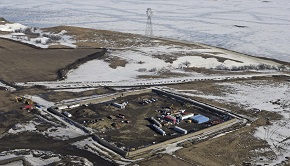 [posted by Steven Mufson on The Washington Post, February 14, 2017] The Standing Rock and Cheyenne River Sioux Tribes on Tuesday submitted a new filing in a District of Columbia federal court in another last-ditch effort to stop completion of the Dakota Access pipeline in North Dakota.
[posted by Steven Mufson on The Washington Post, February 14, 2017] The Standing Rock and Cheyenne River Sioux Tribes on Tuesday submitted a new filing in a District of Columbia federal court in another last-ditch effort to stop completion of the Dakota Access pipeline in North Dakota.
The filing calls the actions of the Army Corps of Engineers in issuing a final easement for the oil pipeline — as well as the agency’s environmental analysis and regulatory actions — “arbitrary, capricious, and contrary to law.” It asks the court to grant a partial summary judgment and vacate that easement.
Unlike the previous filing, which made an argument on religious grounds because of the sacred nature of Missouri River waters there, this one cites alleged violations of the National Environmental Policy Act, the Administrative Procedure Act and other statutes.
The filing says President Trump, who within four days of his inauguration directed the Army Corps to “review and approve” pipeline permits on an expedited basis, was “perpetuating our nation’s pattern of broken promises to the Tribe.”
The tribes say the draft environmental assessment submitted by Dakota Access’s owner, Energy Transfer Partners, was “deeply flawed.” The document allegedly disregarded tribal rights and opposition, failed to assess spill risks and revealed that the owners had abandoned an alternative route north of Bismarck, N.D., because of spill concerns. The filing says Energy Transfer Partners should have submitted a more rigorous environmental impact statement.
The Interior Department’s solicitor had acknowledged that the Standing Rock tribe held “expansive Treaty rights in and around Lake Oahe” where the pipeline would cross, just north of the tribe’s current reservation. The lake was created by dams the Army Corps built decades ago across the Missouri River.
The filing also argues that the entire pipeline dispute must be seen in the context of the Fort Laramie treaties of 1851 and 1868, which granted the tribes control of a broad area, including the land where the pipeline is being constructed and the waters of the Missouri River.
